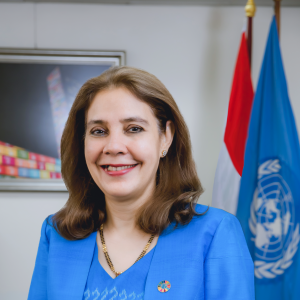I am pleased to be here as we take women entrepreneurship in Indonesia forward in partnership with government, industry associations, multinational corporations and local women entrepreneurs in alignment with the SDGs.
Let me thank you all for your commitment to connecting women-led businesses with buyers abroad in a win-win for gender equality, decent work creation and sustainable economic growth.
The collaborations between the Ministry of Trade, ASEAN’s Trade Mission, ITC, the British Government, women entrepreneurs and the UN are excellent examples of how we can work together to further the agenda of women in trade.
The Ministry’s leadership and forward-looking stance is vital to this process, which is critical as women form the backbone of Indonesia’s economy.
Indonesian woman entrepreneurs are well positioned to make a far greater impact on domestic markets and enter international ones.
Nearly two-thirds of all MSMEs are led by women, a rate twice the global average. Women-owned MSMEs contribute to almost a quarter of the country’s labour force and account for 9% of GDP.
By opening up new horizons for these businesses through foreign trade, we will turbo-charge the SDGs by empowering women to climb the income ladder.
This will contribute greatly to their wellbeing and benefit their families and communities. It will also be key to the country’s ambition to break out of the upper-middle-income trap by mid-century.
Evidence tells us that most women-led businesses trade only within ASEAN.
ITC’s detailed assistance, in partnership with government and the private sector, is helping some of these businesses to expand their markets to the UK and EU in sectors such as textiles, apparels, handicrafts and footwear.
The SheTrades program is also bolstering the evidence base for understanding the barriers women entrepreneurs face in accessing these markets and the strengths they can leverage in doing so.
This is done partly through face-to-face meetings between foreign buyers and women entrepreneurs, which build trust and strengthen personal connections.
I want to thank IKEA for expanding business opportunities to some of these women through long-term orders, which will ensure secure livelihoods for them.
I would also like to thank Unilever for partnering with ITC on boosting its gender-responsive corporate procurement in Indonesia and integrating more women-led businesses into its supplier database.
I am heartened by both companies’ commitment to upskilling and human capital development in order for these women entrepreneurs to be able to comply with the sourcing requirements of large corporations such as IKEA and Unilever.
Mutually beneficent arrangements like these strengthen business-to-business partnerships, which are going to make women entrepreneurs’ products and services more competitive in profitable markets.
The expansion of women-led businesses into these markets will also yield great economic and social dividends for Indonesia.
It will have a direct bearing on sustainable growth, female empowerment and gender equality by allowing Indonesian women to take their rightful place front and centre in the economy through increased foreign trade.
To that end, the SheTrades Program is working closely with government to promote a more inclusive economic policy environment.
Indonesia’s progress on the SDGs has been robust and SheTrades is one important way in which the country can accelerate progress even more.
Today we are taking a big step towards empowering women entrepreneurs to increase their livelihoods.
The results of their greater participation in foreign trade will be transformative for their businesses, communities and the country as a whole.
Thank you.





